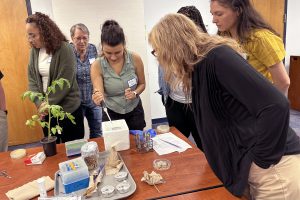Eighteen middle and high school science teachers from around Florida gathered at Fifield Hall on Saturday, May 18, for the sixth edition of the Plants Get Sick Too! workshop, learning about plant diseases from UF/IFAS plant pathologists.

Teachers attended sessions on bacteria, viruses, fungi and citrus greening, led by Plant Pathology graduate students, and toured the Plant Diagnostic Center.
For Ashley Turner, a third-year teacher at Winter Springs High School in Seminole County, the workshop presented an opportunity to introduce her own interests into her curriculum. Turner, a 2020 UF Horticultural Sciences graduate, took an undergraduate Plant Pathology class while at the University of Florida. “I teach Environmental Science, and I expect to be able to incorporate this into our food sustainability chapter,” Turner said.
Dee Reedy, who teaches Biotechnology to 9th-12th graders at North Marion High School, attended the workshop because she hoped to find potential research projects for her Biotechnology 3 students. After seeing the bacteria lab demonstration, she realized it was relevant to her younger students as well. “My Biotechnology 2 students do a lot with bacteria and with plants. We can definitely do these labs” at school, she said. Reedy has been teaching at North Marion for 27 years and is four years from retirement, but has an eye on the future. “I’m already cultivating my replacement. I’m trying to provide a resource to the new teacher walking in.”
 Kiersten Fullem is a Plant Pathology Ph.D. candidate, and helped lead the session on bacterial diseases. “There’s not a lot of information about plants and plant diseases outside the collegiate level,” Fullem said, and she hopes the workshop will help expose students to agricultural education. “Hopefully we’ve given them some interesting topics and demonstrations that they can take back and use in their classrooms. We were really pleased with how interested and engaged the teachers were.”
Kiersten Fullem is a Plant Pathology Ph.D. candidate, and helped lead the session on bacterial diseases. “There’s not a lot of information about plants and plant diseases outside the collegiate level,” Fullem said, and she hopes the workshop will help expose students to agricultural education. “Hopefully we’ve given them some interesting topics and demonstrations that they can take back and use in their classrooms. We were really pleased with how interested and engaged the teachers were.”
The workshop was funded with grants from USDA and from Corteva Agriscience, and was promoted by the UF Center for Precollegiate Education and Training and the Florida Museum of Natural History’s Scientist in Every Florida School program. Teachers were selected primarily from Title 1 schools, where a high percentage of students come from financially disadvantaged families.

“We hope the teachers will incorporate the knowledge they gain today into their classroom,” said Erica Goss, an Associate Professor of Plant Pathology and one of the organizers of the workshop, “and we’ll continue to work with them after today to do that.”
“There are certain subjects that some people find innately interesting, like forensics, said Turner, the Winter Springs teacher. “I feel like people kind of glaze over plant pathology, even though that is really cool and nitty-gritty as well.”
 11
11
